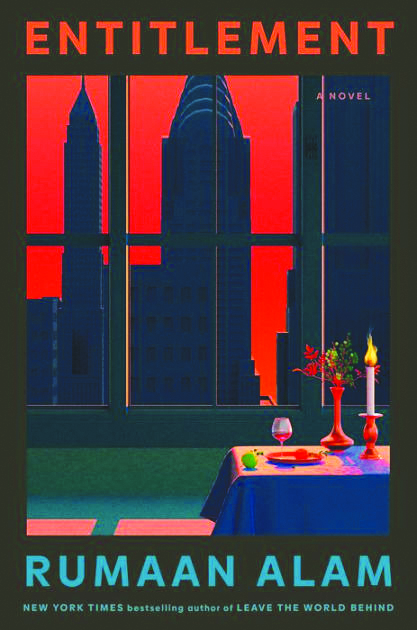Entitlement, by Rumaan Alam (Riverhead, 288 pages)
One of the more peculiar aspects of our society is that some of us have so much money that it’s actually a challenge to get rid of it, and some of us have so little that we work multiple jobs just to keep the lights on. In a just world, the former problem would cancel out the latter, but it’s not.
Rumaan Alam tackles this paradox in Entitlement, his fourth novel, which explores the prickly issues of both money and race. It is a compelling storyline: A young Black woman is hired to work for an aging white billionaire who has established a foundation to distribute his money to worthy causes.
The fictional Asher and Carol Jaffee Foundation has shades of the real-life “Giving Pledge” that many billionaires have signed. Asher Jaffee made his money with a company that delivered office supplies (“Jaffee … in a Jiffy!” was its brilliant motto). Now 83, he still has the kind of energy in which he bounds, rather than walks, and has no interest in retiring. In fact, he is more comfortable in an office than at home. “The office was the place where things happened, the place where he was necessary, the site of his every victory.”
At the foundation, Asher has a small and fiercely devoted staff that tends to his four-day work week, which is filled with people wanting to talk to him about his money.
Brooke Orr, 33, enters this world after nine years of unsatisfying work as a teacher. She is the adopted daughter of a single mom, an attorney who works in the vaguely defined field of reproductive health and who chose to raise her children with the help of three close female friends, rather than within the confines of marriage. Brooke’s own circle includes the daughter of one of her mother’s friends, Kim, and a gay man, Matthew, that they befriended while all were matriculating at Vassar College. (“As Brooke saw it, she and Kim were continuing what their mothers had started: a most modern little family.”)
When she joins the Jaffee Foundation, Brooke is doing well enough but is also in the vaguely annoying position of watching those around her seem to do even better. Her brother is engaged to be married, and though she loves him and doesn’t herself want to get married, her interactions with the couple give way to sardonic inner dialogue on “the smugness of young people who believe they have invented love.” Meanwhile, her friend Kim has recently come into an enormous inheritance, sum unknown, that has allowed her to pay cash for an apartment worth $2 million.
While Brooke loves her friend and is genuinely glad for her good fortune, the imbalance still puts a quiet strain on their relationship. After seeing the new place for the first time, “She saw Kim’s succession of Sundays in this two-bedroom apartment. She saw coffee-stained cups upside down in the dishwasher, saw flowers bought on impulse slouching on a table, saw an orange peel, dried into brittle shells, left to molder on the marble countertop. The cleaning lady would see to that. She saw comfort and solitude and joy and it looked absolutely thrilling to her. Kim was dear, Kim was good, but Kim had done nothing to deserve any of this earthly comfort. And wasn’t the universe meant to work that way, wasn’t it governed by justice?”
But Brooke is enjoying her own good fortune, in that Asher Jaffee has been impressed by their limited interactions and wants her to have more responsibility. She’s smart, and he sees this, but it’s also possible that he’s wanting to have a fatherly influence on Brooke — with her father out of the picture all of her life, and his own daughter having died in the 9/11 attacks at age 38.
Jaffee is generous with his money, his time and his advice, telling her, “Demand something from the world. Demand the best. Demand it.”
Brooke internalizes the advice and begins to change subtly as she grows into the position and assumes more responsibility. But she also uses Jaffee’s advice as justification for bad choices as she becomes more comfortable in the moneyed world and wants her share.
Alam’s previous novels include 2020’s acclaimed Leave the World Behind (which I loved and awarded a rare A+). That book also explored contemporary themes, including race. Entitlement strives, but never achieves the tension that ripples through Leave the World Behind, making it both a smart cultural critique and an old-fashioned page-turner. Nor does Entitlement convince the reader to care all that much about either Brooke or Asher and what happens to them. Brooke has a narrative arc, to be sure, but at no point in it does she want anyone to love her.
Alam’s voice is fresh and unique, and his cultural observations spot-on. While Entitlement will likely win many accolades and maybe make a short-list or two for a prestigious award, it is, like Brooke’s pre-Asher life, ultimately unsatisfying, even for a cautionary tale. B-

